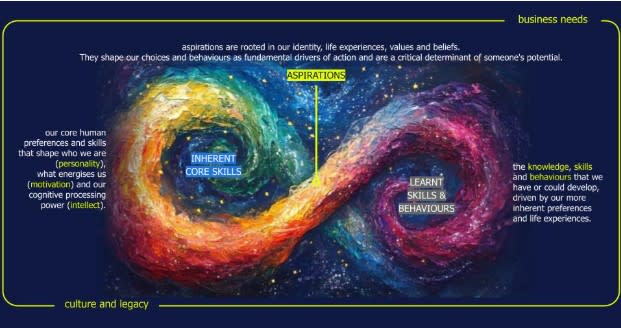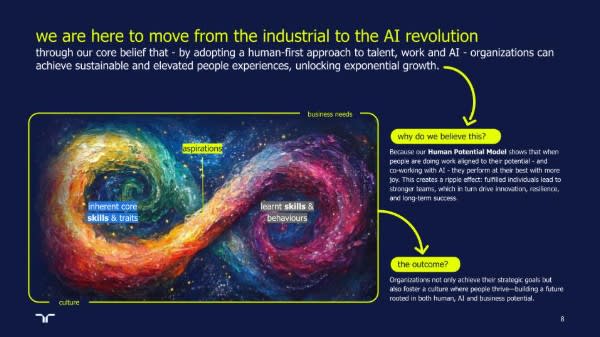the power of human potential in the AI revolution.
(first published September 24, 2023)
How 'skills' will save humans and companies.
Once upon a time, around 300,000 years ago, humans were mostly hunter-gatherers. They populated most of the Earth by the time the ice age ended 12,000 years ago. That's when the skills-based model started. The agricultural revolution made our ancestors transition from nomadic life to stationary existence as farmers in permanent settlements. The complexity of human settlements required different skills as housing, schooling, accountancy, writing, healing and other needs developed. Few, still current, job families were thus born.
If you look back through history, skills have always been critical to humans. Ancient gods across cultures embody specific skill archetypes. Heroes from global mythologies represent clear sets of traits and talents. Our collective human story is full of these heroes and their skills — some magical, some practical — embarking on transformational journeys with allies, enemies, prizes and rewards.
Then came the Industrial Revolution, reducing humans to machines on factory lines for two centuries. Ironically, who could have predicted that AI would now free us from robotic tasks, enabling humans once again to focus on their uniquely human strengths?
Anyway, we are skipping ahead; let’s go back to 1951, when the U.S. Army the label “soft skills” to differentiate them from “hard skills.” In 1988, soft skills (i.e., learning, critical thinking, reasoning) were listed as critical by the U.S. Secretary of Education. In 1999, the World Health Organization identified core life skills like decision-making and problem-solving. In 2006, labor economists at MIT and Harvard stated economic changes driven by emerging technology and globalization would make these skills even more critical.
Up until 2010, skills were largely considered secondary to education and past experience. Now, companies increasingly recognize the value of core skills — openness to unlearn, adapt and re-learn — even in people without traditional credentials or direct experience.
This skills-based hiring and talent management approach marks the true convergence of the digital revolution. Ironically, AI — once thought to threaten human roles — is now liberating people from repetitive tasks, empowering them to fully develop their inherent human potential. Investing in human adaptability alongside AI isn't just a trend; it's the future of work.
Here are few stats if you don’t believe me:
-
Hiring for skills is five times more predictive of job performance than education.
-
Hiring for skills is two and a half times more predictive of job performance than work experience.
-
There is a 25% – 70% reduction in turnover when a position and person are truly matched.
-
80% of talent plan to change employers because they have not been given the opportunity internally to grow, move or shift.
-
50% of the workforce will need to be reskilled in the near future.
human potential is back to stay
“Human potential” is the everlasting agility of humans to learn, unlearn and recombine a set of learned and more inherent core skills together with individual/social aspirations and motivations. Especially now that AI will revolutionize the way we learn, think, work and be.
We believe that core skills, combined with motivations and aspirations, are way more powerful than anything else. The combination of “being” and “wanting” drives people outside of what they know and what they did to invent new ways, new paradigms and new discoveries. We believe, in fact, that:
-
People’s abilities can be thought of as Lego-like blocks—some innate, some learned. While simplified, this approach helps structure our understanding of talent without ignoring the true complexity of identity.
-
Abilities can be improved by education, but they're not strictly defined nor linked to academic achievements.
-
Past experiences don't dictate future growth in a linear way. That deterministic view worked in the past — but it’s time we moved beyond it.
-
People remain adaptable learners throughout life, not just in youth. While neuroplasticity decreases with age, our capacity to learn, unlearn and evolve remains fundamental.
-
Organizations thrive when they see their people as dynamic learners, not just the sum of their education, past experiences and assigned tasks.
-
Humans and AI each express unique capabilities and skills. It’s not a competition — it's a complementary dance, a collaboration between two intelligent entities.
-
Equity isn't about equal backgrounds or similar experiences; it's achieved by enabling people to apply their deeper inherent skills, traits and values — those core parts of who they are, not just what they have learned.
-
Learning, unlearning or re-learning can trigger powerful emotions. Companies can't successfully reskill without genuinely supporting the emotional and mental wellbeing of their people.
how do we look at skills at Randstad?
At Randstad, we don't divide skills into hard or soft categories. Instead, we talk about learned skills (what work is done) and inherent core skills (how work is done). We also layer in aspirations (why work is done).

We call this framework Human Potential — the essential approach for humans to evolve alongside AI as everything around us transforms. Human Potential is our key to decoding reality, cultivating workplace wisdom, and nurturing the inherent core skills that will shape the future of work.
the model in depth: a closer look.
Learned skills are aligned to what work is done or the knowledge, skills and behaviors that we have or could develop, driven by our more inherent preferences and life experiences.
These skills are related to what we have learned and what we can reuse even in different contexts: for example, marketing skills used in employer branding, procurement skills used in risk management, and coding in one language used in other languages. Those professional ‘tribes’ started to self-emerge when agriculture became a human experience.
Inherent core skills relate to how we do work. They include our natural human preferences and capabilities — our personality, what motivates and energizes us, and our cognitive abilities.
These core skills emerge early, primarily within the first seven years of life, and can be nurtured or diminished through experience. While not solely determining career paths, these more natural talents significantly influence our professional interests, making some roles feel more enjoyable and tasks easier to master. Examples include cognitive and personality traits such as critical thinking, lateral thinking, introversion, emotional intelligence and curiosity.
Consider relationship wisdom, an inherent core competence encompassing core inherent skills such as empathy, verbal reasoning, systemic thinking and emotional intelligence. Research consistently shows these interpersonal gifts strongly impact employee value and performance, often surpassing technical abilities. Organizations investing in relational wisdom typically experience measurable improvements across their business, including enhanced employee engagement, retention, productivity, decision-making and financial performance. Our research demonstrates that companies with high relational wisdom achieve 67% better business outcomes.
Aspirations represent why work is done — reflecting our identity, cultural patterns, beliefs and values. They are deeply rooted in our life experiences and shape how we choose to use our skills, influencing the environments and contexts we seek out to achieve meaningful impact aligned with a company's identity and culture.
Aspiration is a driving force — what Hillman describes as Daimon in The Soul’s Code: In Search of Character and Calling. It compels us toward specific goals or actions, driven by personal interests, rewards, expectations or the desire for achievement. As fundamental drivers of behavior, aspirations critically shape individual potential.
Aspirations embody our strongest desires, ambitions or callings — often long-term goals reflecting our hopes, dreams and ideals. When skills (core inherent or learned) align with aspiration, they become powerful and unstoppable forces, energizing us, fueling happiness and enabling exceptional performance.
Aspirations refer to a strong desire, longing or ambition to achieve something, often a long-term goal or higher pursuit. A calling. It's a forward-looking sentiment that often embodies an individual's hopes, dreams or ideals. When core or learned skills are aligned to aspirations, they become indomitable: they make us happy, they give us energy, and they fuel us.
how do you build an organization centered on skills in the AI revolution?
To become a skills-based organization powered by human potential, you must fundamentally redefine how work itself is structured and valued. You need to rethink it with AI and humans working together, because AI will fundamentally signal the real passage between the Industrial Revolution to the future one. Here’s how to get started:
- step 1: deconstruct and reconstruct work
Begin by breaking down traditional job descriptions into tasks and outcomes. Clearly define what success looks like, not in terms of roles but in measurable outcomes. Identify the core DNA — essential skills, behaviors and aspirations — needed to deliver these outcomes effectively. Consider not just learned skills but inherent human skills such as critical thinking, creativity and emotional intelligence. - step 2: redesign work for human-AI collaboration
Once you've identified your organization's essential DNA, redesign workflows to leverage both human and artificial intelligence strengths. The future of work lies in human-AI collaboration, where each complements the other seamlessly. - step 3: continuously retrain, reskill and redeploy talent
Establish a continuous learning ecosystem focused on retraining, reskilling and redeploying talent based on evolving business needs. Invest proactively in your people, encouraging them to learn new competencies, master skills and share knowledge internally. Reskilling must become an integrated, ongoing effort — not a one-off event. - step 4: activate human potential
Go beyond skill-building by creating an environment that encourages continuous transformation, unlearning outdated practices and nurturing a growth mindset. Employees should feel empowered not only to adapt to changes brought by AI but to drive change themselves. Foster a culture where collective brilliance and innovation thrive, encouraging employees to teach, learn and do — thus guiding both AI tools and their human colleagues toward shared success. - step 5: continuously empower human potential
Embed the model across all people's experiences, from love at first HI, to hire to move or retire.
By reimagining work through the lens of human potential and purposeful AI integration, your organization will thrive in the new era — transforming talent, reshaping careers and delivering unparalleled outcomes.
The shift to a human potential approach in the AI revolution marks a fundamental change — comparable to Galileo’s revelation that the Earth orbits the Sun. Just as Galileo challenged humanity’s perspective on our place in the universe, embracing human potential challenges how we view work, skills and the role of humans alongside technology. The Industrial Revolution reduced humans to mechanical functions, jobs and tasks; the AI revolution frees us to focus on our inherent strengths, aspirations and adaptability. Now, success depends not on what humans can do but on who they inherently are, what motivates them and how creatively they adapt. Human potential is no longer optional — it's essential for organizations and individuals to thrive in a world where AI and uniquely human abilities shape the future.
